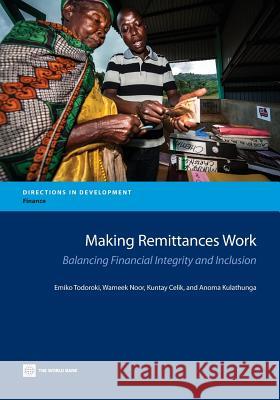Making Remittances Work: Balancing Financial Integrity and Inclusion » książka
Making Remittances Work: Balancing Financial Integrity and Inclusion
ISBN-13: 9781464801099 / Angielski / Miękka / 2014 / 264 str.
H.M. Queen Maxima of the Netherlands, United Nations Secretary-General's Special Advocate for Inclusive Finance for Development stated that 'the impact of helping migrants and their families will be lasting and global if we link remittances to other financial services and make them more affordable and more relevant to their needs." Remittances are a critical source of financing for most developing countries. The importance of remittances goes beyond numbers. For many households in developing countries, they are probably the most stable source of primary or additional income. At the same time, the September 11, 2001, terrorist attacks exposed the use and abuse of remittance channels for financing terrorism. In response to this threat, the international community issued new international anti-money laundering/combating the financing of terrorism (AML/CFT) standards on remittance transfers and their service providers. For the first time, remittance service providers were required to be brought under the government oversight and either registered with or licensed by a competent authority, and to be subject to AML/CFT obligations. While the FATF Recommendations appear straightforward on paper, regulating and supervising in practice the money transfer business has proved to be a very challenging task in both developed and developing countries. This book assists policy makers, regulators, and supervisors of money transfer businesses to craft effective regulatory and supervisory frameworks governing remittances that meet international AML/CFT standards, while at the same time ensuring that the neediest have access to these crucial services.











